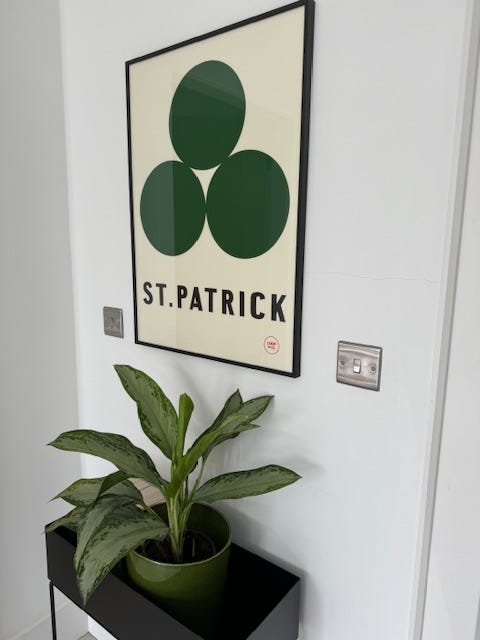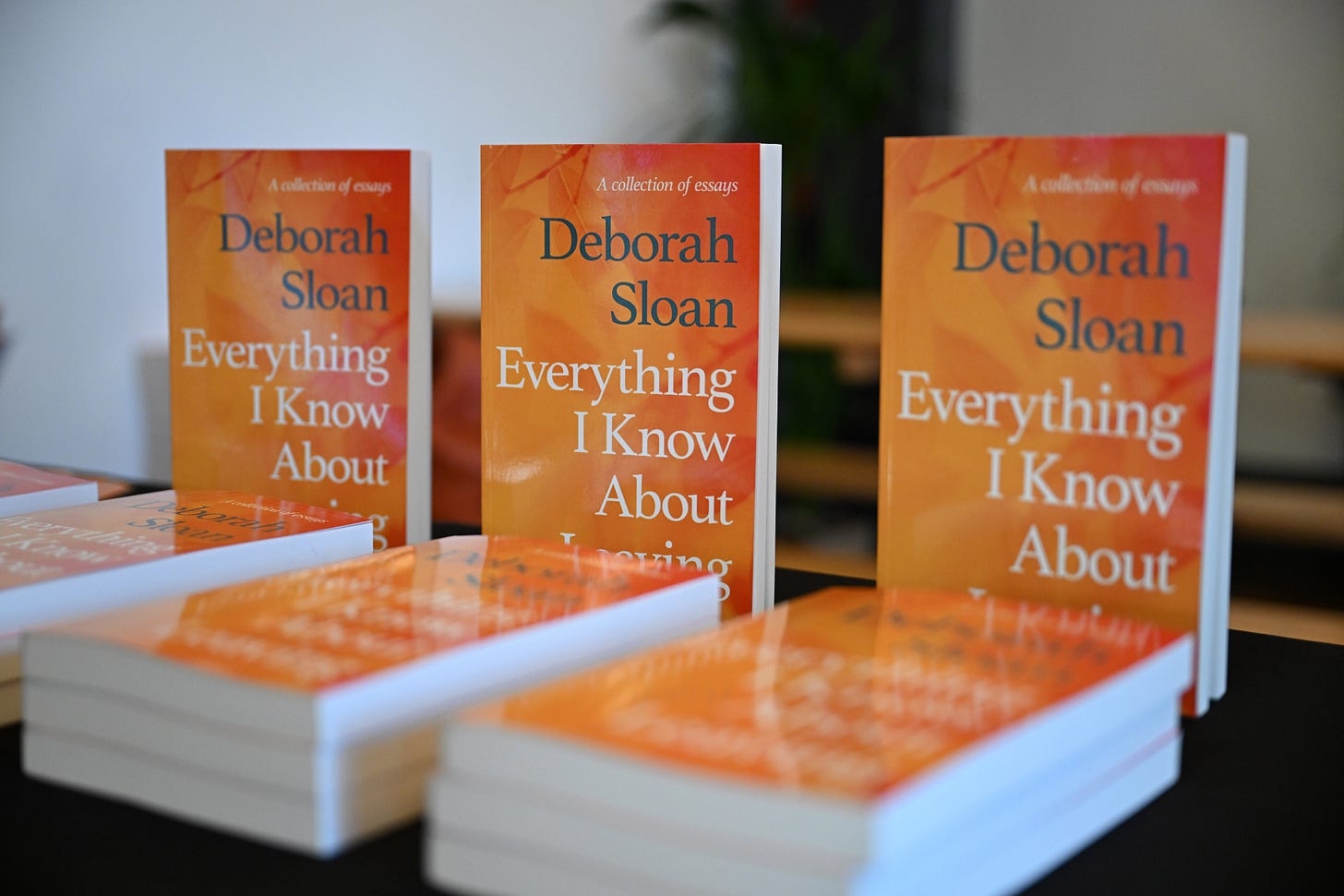I did not do anything particularly Irish on St. Patrick’s Day. On Monday 17 March, I did not drink Guinness. I did not eat soda bread. I did not perform a jig or listen to a fiddle or bring out my tin whistle. I did not sit by an open fire and smell the turf. I did not say top of the morning to anyone. I did not watch a parade or a rugby match. I did not quote anything about arising now and going to Innisfree or tell people I hoped the road would rise up to meet them. I did not break Lent. I did not make that Nigella Lawson chocolate cake with the cream cheese frosting because I did that last year, and everyone said it was too heavy. The closest I got to Down Cathedral where Patrick was supposedly buried was through marriage because my husband had driven through Downpatrick on Sunday. I did, however, spot a shamrock, but that was only because I was on the Aer Lingus website, looking for flights to Madrid. I did get an email from LK Bennett encouraging me to embrace green. And in a slight nod to the national culinary scene, I suggested sausages and champ for dinner.
All in all, St. Patrick’s Day was a bit of a dull affair, so dull, that on my way to source envelopes to dispatch books1, I decided I’d have lunch and pop into my local café which “elevates the art of the everyday”. It was busy because no one else had anything to do either and for some reason, I was willing to pay [redacted amount] for some hand-brewed coffee, even though I have no idea what that means, brewing by hand. This made me think of August Blue by Deborah Levy when Rajesh “who was born in Dublin and could speak fluent Irish” is talking to Elsa, a famous concert pianist, and he says, “what I really missed in the lockdowns was buying a coffee. Sipping a flat white. If my identity is so fragile it depends on a flat white to keep it together, I can't see the point of those years I've spent reading difficult theory and philosophy. Capitalism sold a flat white to me as if it were a cup of freedom”. And I knew what he meant, only what I missed was a latte.
In my local café, they’d wanted to put something Irish on the menu, but stew was not their vibe, so they were offering a spice bag instead, and when I researched this, Wikipedia said it was a popular hangover cure, a fast-food phenomenon that had been voted 'Ireland's Favourite Takeaway Dish' in the 2020 Just Eat National Takeaway Awards. It was a mix of fried chicken, chips, sliced onions and red peppers doused in the much neglected five spice2, mainly sold in Chinese takeaways. This one came in a paper bag with curry sauce on the side, but I didn’t order it. I had the broccoli tempura instead and there were chillis in it or maybe they’d doubled up on the five spice and as I persevered with it, my husband said, you’re sweating under your nose.
After lunch, I continued with the novel I’d been reading which I hadn’t specifically picked for St. Patrick’s Day, but which happened to be set in the Irish capital. It was called Breakdown3 and it was about a fifty-ish woman who lives in middle-class suburbia, and she wakes one morning to the “slow metronome” snoring of her husband, a man who is deeply satisfied with himself and knows his Apple watch will tell him he has reached his daily goals, and realises she’s had enough. Instead of heading to her job in a secondary school, she turns left at the traffic lights and drives in the opposite direction and after a bit of a detour in a shopping centre and in the hairdressers and in a service station and having a few pints, she gets the ferry from Rosslare to Fishguard. She rents a cottage in the middle of the Welsh countryside where she plants tulips and rears chickens.
My husband asked me was I going to read any more passages out to him because I’d shared the one about her wanting to be an artist, and how she’d always thought she’d return to making Art once she had a reliable income, and/or when she was married and/or when her children were older. “Postponement,” she says. And the one where she’d listed all the things she couldn’t stand anymore like putting one more plate into the dishwasher, and the one where she said how exhausted she was by WhatsApp.
And this woman didn’t have a name because she is a wife and a mother, and we’re meant to understand that she doesn’t matter in the society in which she lives. “The old boys at the bar pay no attention as I place my order and find a table. A middle-aged woman with short hair is invisible,” she says.
And this woman had things to say about why she needed to leave.
“In the Ireland that doesn’t exist, everyone ambles to the local pub in the soft rain to drink stout and to listen to traditional music and to have the craic. Where society is secular and tolerant, and healthy young women and men play traditional sports in lush green fields and are hospitable to strangers and proud of their native language. Where life is easy-going and every second person is some class of poet”.
“I have seen this country on TV and read about it in books, but I have never lived there. I have lived only in a country obsessed with money. The earning of it, the spending of it, the stashing of it, the making it ‘work for you’, the bringing up of children who understand its ‘value’. I am tired of living in a country that doesn’t exist,” she says.
“Who was St. Patrick4?” I asked Google because whilst I knew he’d been credited with bringing Christianity to Ireland in the fifth century, I still look him up annually. I’d noticed this year that his breastplate was being quoted a lot, the Christ before me, the Christ behind me, the Christ beneath me, the Christ above me and so on. It turned out that Patrick was Welsh, and he’d never been properly canonised as a saint, and the only historical proof of his existence were two documents he wrote in Latin because the linguistic situation was complicated at that time. The Internet had concerns about him, his origins, his self-appointment. Anyway, neither of these documents were his breastplate because it dated from the eighth century, 300 years after his death. And it wasn’t, as I’d naively thought, an inscribed piece of armour worn in battle but more of a metaphorical shield, a prayer for spiritual protection which had been adapted into an English hymn by the woman who wrote All Things Bright and Beautiful. But it seems wrong to mention all this when the public holiday means so much to people. And I’m not having a go at the breastplate because it was all about asking for divine help to guard against all sorts of dangers like false prophets, heathens, heretics, witches, poison, burning and drowning.
But it didn’t call for protection from the dangers of lifestyle.
“These days, I see the signs of breakdown everywhere, inside people, in their families, in communities, in society, in the planet,” said the unnamed woman in Breakdown.
“Like everyone else, I spent most of my life pretending that I couldn’t see them. It was easier that way. Easier to take the cat to the grooming salon and plan sun holidays and lay cobble loc in the driveway and worry about food intolerances and fall asleep in bed at night with Netflix playing on a giant wall-mounted TV,” she said.
As I finished reading this unnamed woman’s story and left her tending her geraniums, I watched The White Lotus on Sky Atlantic, and there, I saw Tim breaking down too. He wasn’t an Irish woman, but a man born into the American dream, a financier, lured into international money laundering because he has a lifestyle to maintain. He’s about to put a gun to his head. His wife asks him what is going on. He hasn’t been acting like himself. “Do you understand the expectations on me from day one,” he says. “I haven’t known a single day without all this sh*t put on me”. “There’s no reason to be stressed,” she replies. “You’ve already succeeded in every way”. And she goes back to bed. “Please, God. Please. Tell me what to do,” he calls out as the episode ends.
And on the last page of Breakdown, the unnamed woman says, “this probably is just one more ‘story’ about a woman who had everything and wanted MORE”.
And on St. Patrick’s Day, I think I got sold some hand-brew coffee and a broccoli tempura as if it was a cup of freedom.
IMPORTANT ANNOUNCEMENT: The book launch has happened. More details to follow next Friday on how it went. Everything I Know About Leaving is now available on Amazon.
If you are in the UK, copies can also be purchased directly from me via PayPal for £12.99 (including postage and packaging).
See important announcement.
See Michael McIntyre.
By Cathy Sweeney.






I was catering for a St Patrick's day event so I spent most of the day making Irish stew (and a vegan one with mushrooms and Guinness which was just as tasty). Thoughtful writing as ever Deborah. I'm savouring your book - reading slowly and attentively.
I had a quiet one myself! The weaving narrative keeps me intrigued right to the end!